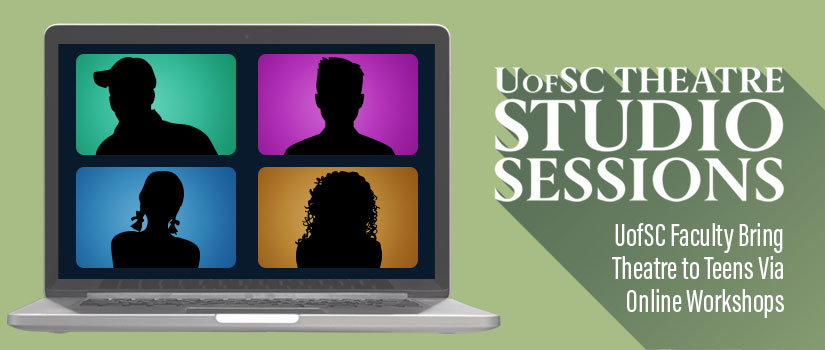The radical move to virtual teaching in these last few months has dramatically changed the face of theatre education, but what it hasn’t affected is students’ desire to learn.
That’s the discovery of South Carolina theatre faculty who offered free online workshops to high school students May 18-28.
The initiative, dubbed “UofSC Theatre Studio Sessions,” was organized by Associate Professor Peter Duffy, head of the program’s graduate-level theatre education track, as a way to help high school drama teachers continue providing quality experiences to students while being physically separated.
“I’m in communication with lots of drama teachers who have been feeling that coming up with online material for drama classes has been very difficult,” says Duffy. “I thought, ‘We’re out of our semester now [at UofSC], so maybe there would be some faculty members who would want to help these teachers out.’”
Duffy was joined by professors Jim Hunter and Erica Tobolski, senior instructor Valerie Pruett and instructor Lisa Gavaletz in developing workshops representing a wide array of interests. Twelve workshops were offered, with topics that included dialect and voice work, monologue delivery, lighting, stage management, applied theatre, special effects makeup, hair/wig design, and specialized costume techniques.
Once word about the workshops went out, the response was immediate, with many students taking advantage of multiple sessions. In all, 84 students participated, filling a total of 215 available slots. The students were largely based throughout South Carolina, from Charleston to Greenville, with a few students from North Carolina and two living in Munich, Germany.
“Students have always been hungry to learn, so I don’t think online learning has increased that desire. It has, however, made us more inventive with how we connect with them.”
“What the pandemic has done is make us take an initiative that we had been trying to do in person — offering workshops to high school students — and tailor it for the current need,” says Duffy. “Students have always been hungry to learn, so I don’t think online learning has increased that desire. It has, however, made us more inventive with how we connect with them.”
The enthusiasm of the students was felt by instructors across the board.
“This is what every teacher looks forward to — a room full of interested and motivated students,” says Erica Tobolski, who offered voice and dialect classes. “I could see them working on the dialect phrases before I even began the workshops.”
Duffy concurs, adding that it’s the eagerness of the young students that makes teaching them such an enjoyable venture. “They’re at an age where they are starting to see themselves in their future because it’s only a few years away. Theatre is something that’s becoming a passion, and that’s really exciting to work with.”
The great value of college-level faculty reaching out to high school students, the instructors agree, is in opening students’ eyes to a wider world of technical and artistic knowledge, as well as career possibilities.
“It’s a great way to expose youth to a variety of professions, and there are so many viable and in-demand careers that students aren’t even aware of,” says Valerie Pruett, a hair, makeup and costume instructor. “Knowing the possibilities prior to college could help to build a skilled workforce of artisans.”
Stage management instructor Lisa Gavaletz hopes the workshops encourage interested teens to stay the course in their theatre journeys. “These workshops show that there are people who have had a successful career doing what they love,” she says, “and hopefully that encourages the students to advocate to their families the possibilities of a career in the arts.”
Duffy says that with the success of the initial online classes, another round of “studio sessions” will be planned for the fall, whether in-person or over the internet.
“As long as faculty are happy to do it, we’ll continue,” he says. “The online world isn’t a substitute for in-person work, but it’s still a fantastic endeavor that we should continue. This is not going to go away when we open back up.”
